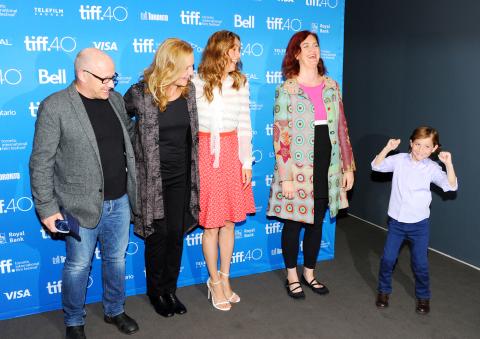Lenny Abrahamson’s adaptation of Emma Donoghue’s novel Room, the horrific tale of a woman and son held captive for years in a tiny space, won on Sunday the 40th Annual Toronto International Film Festival’s top prize — the Grolsch People’s Choice Award.
Both the Booker-shortlisted bestseller and the film were inspired by Elisabeth Fritzl, who endured 24 years of captivity in the basement of her family home in Austria, where she was repeatedly raped by her father and bore seven of his children.
She escaped in 2008.

Photo: AP
Abrahamson (Frank, What Richard Did) told a news conference last week that he tried to stay away from the true story in making the movie.
The Irish director researched other cases.
“It’s amazing to look at some of these homecomings that are captured by news crews,” he said. “But for any really good piece of storytelling, it has to be about those specific characters. So we just stuck to the truth of the characters, and not to reference any true crime.”
The film tells the story of a young woman and her child’s escape from 10 years of captivity, as told through the eyes of five-year-old Jack — played by Jacob Tremblay.
Born in the three meter-by-three meter space, this is where Jack eats, sleeps and plays. For him, it’s home. But his “Ma” (Brie Larson) has a plan to escape. The world beyond the room leaves the boy frightened and awestruck, while his mother has to whip up the courage to face it again.
Sean Bridgers plays Ma’s kidnapper Old Nick — and Jack’s father. The film, which screened in Toronto after an auspicious Telluride premiere earlier this month, also stars William H. Macy and Joan Allen.
Sunday’s prize puts Room among possible early frontrunners for the Oscars.
Several past winners in Toronto went on to snag best picture Academy Awards, including 12 Years a Slave, The King’s Speech and Slumdog Millionaire.
Runners-up for the Toronto People’s Choice Award, meanwhile, were Tom McCarthy’s Spotlight, starring Mark Ruffalo, Rachel McAdams and Michael Keaton in the true story about Boston Globe reporters who uncovered a massive child abuse scandal and cover-ups within the local Catholic Church, and Pan Nalin’s Angry Indian Goddesses.
Promoted as India’s first female buddy comedy, the film shows a group of women discussing careers, sex, noisy neighbors and street harassment in a frank depiction of contemporary Indian society.
Movie buyers flocked in record numbers to the Toronto film festival this year, with 2,100 bidding on nearly 400 feature and short films from 71 countries.
The distribution rights for 36 films were picked up, including sci-fi horror Hardcore that sold for a reported US$10 million.
Other big money makers included Anomalisa, Eye in the Sky, Forsaken, Into the Forest, Ma Ma, Mr Right, The Program and Sunset Song.
The new television series Trapped by Icelandic director Baltasar Kormakur was bought by the Weinstein Company.

The canonical shot of an East Asian city is a night skyline studded with towering apartment and office buildings, bright with neon and plastic signage, a landscape of energy and modernity. Another classic image is the same city seen from above, in which identical apartment towers march across the city, spilling out over nearby geography, like stylized soldiers colonizing new territory in a board game. Densely populated dynamic conurbations of money, technological innovation and convenience, it is hard to see the cities of East Asia as what they truly are: necropolises. Why is this? The East Asian development model, with

June 16 to June 22 The following flyer appeared on the streets of Hsinchu on June 12, 1895: “Taipei has already fallen to the Japanese barbarians, who have brought great misery to our land and people. We heard that the Japanese occupiers will tax our gardens, our houses, our bodies, and even our chickens, dogs, cows and pigs. They wear their hair wild, carve their teeth, tattoo their foreheads, wear strange clothes and speak a strange language. How can we be ruled by such people?” Posted by civilian militia leader Wu Tang-hsing (吳湯興), it was a call to arms to retake

This is a deeply unsettling period in Taiwan. Uncertainties are everywhere while everyone waits for a small army of other shoes to drop on nearly every front. During challenging times, interesting political changes can happen, yet all three major political parties are beset with scandals, strife and self-inflicted wounds. As the ruling party, the Democratic Progressive Party (DPP) is held accountable for not only the challenges to the party, but also the nation. Taiwan is geopolitically and economically under threat. Domestically, the administration is under siege by the opposition-controlled legislature and growing discontent with what opponents characterize as arrogant, autocratic

When Lisa, 20, laces into her ultra-high heels for her shift at a strip club in Ukraine’s Kharkiv, she knows that aside from dancing, she will have to comfort traumatized soldiers. Since Russia’s 2022 invasion, exhausted troops are the main clientele of the Flash Dancers club in the center of the northeastern city, just 20 kilometers from Russian forces. For some customers, it provides an “escape” from the war, said Valerya Zavatska — a 25-year-old law graduate who runs the club with her mother, an ex-dancer. But many are not there just for the show. They “want to talk about what hurts,” she